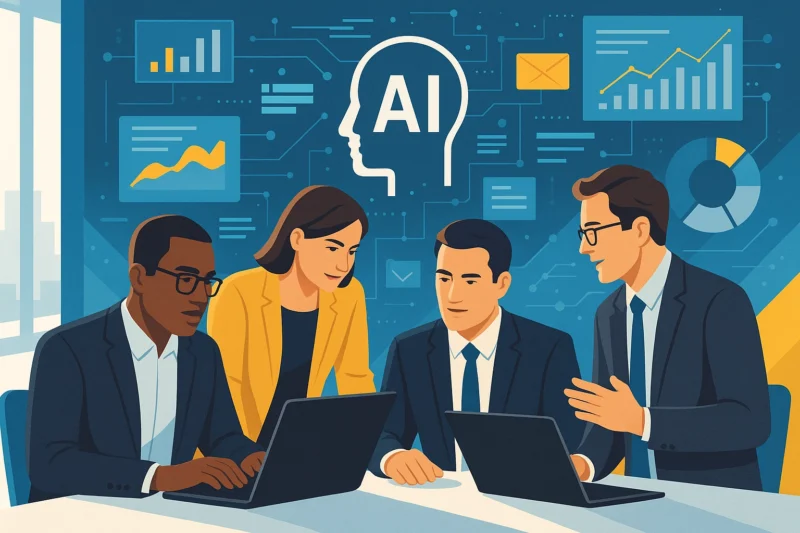How AI and Digital Platforms Are Transforming Work at EY: Insights from Industry Leaders
The Digital Revolution in Professional Services
The integration of AI and digital platforms is fundamentally reshaping how teams collaborate, upskill, and deliver value to clients at EY. This transformation extends beyond simple automation—it represents a paradigm shift in how professional services firms operate, innovate, and create competitive advantage.
We asked industry thought leaders to share their perspectives on how AI and digital platforms are transforming the way teams work, develop new skills, and deliver exceptional client value. Their insights reveal a consistent theme: the future of consulting is here, and it’s powered by the synergy between human expertise and artificial intelligence.
From Grunt Work to Strategic Impact
Jimmy Fuentes, Consultant at California Hard Money Lender, captures the essence of this transformation:
“Everything is being transformed by AI and digital platforms, including how teams are working together and how fast we can bring client results. It is not only automation. It’s acceleration.”
Fuentes highlights a critical shift in the consultant’s daily experience. Tasks that once consumed hours—compiling data, cleaning spreadsheets, preparing presentations—now take minutes with AI assistance. “It is the equivalent of less time in the weeds and more time resolving real business issues. It is changing the consultant job to that of a strategist.”
This acceleration extends to learning and development. As Fuentes notes, “Upskilling is infused into the labour process. Performance data on platforms help in determining knowledge gaps and deliver content that is relevant at this moment and not in a quarterly training program.” The result? Teams that not only work faster but think faster, with analysts brainstorming alongside large language models and managers making decisions with AI copilots.
The Strategic Evolution of Consulting Roles
John Beaver, Founder of Desky, emphasizes how AI is fundamentally changing the consultant’s value proposition:
“AI is changing the way consultants work by shifting their roles from task execution to a more strategic-based role. Since AI handles repetitive tasks, such as data analysis & compliance checks, consultants are now able to focus on creative problem-solving and building client relationships.”
Beaver provides a practical example: while AI can identify top candidates for a position, consultants must still evaluate critical human factors like emotional intelligence and team fit. This division of labor requires new competencies. “EY is focused on upskilling its teams to ensure they can work effectively with AI to help them adapt to clients’ changing needs. The outcome is a more strategic, AI-driven engagement which offers more value to clients.”
Breaking Down Boundaries Through Digital Collaboration
Jonathan Carcone, Principal at 4 Brothers Buy Houses, highlights the revolutionary impact on team collaboration:
“With the entry of AI and digital platforms, we have revolutionized the way teams can work in cooperation, upskill themselves and serve patrons. Application of technologies like machine learning and automation has led to the fact that activities that took longer to achieve earlier are accomplished in a fraction of that time.”
Carcone emphasizes how these tools enable teams to work seamlessly across borders and functions while providing continuous upskilling opportunities. “The very tools provide new opportunities related to employees constantly upskilling themselves and keeping up with a technology environment that is constantly evolving at a fast pace.”
Delivering Enhanced Client Value
Geremy Yamamoto, Founder of Eazy House Sale, focuses on the client value proposition:
“New digital tools integrated with AI to help teams do their best work faster and better are evolving quickly, and changes are palpable at EY. These developments have allowed teams to make things easier, work more effectively and provide better quality of value to their customers.”
Yamamoto points to the dual benefit of AI tools: they simultaneously help team members upskill while enabling better client service. “Along with automation, it has also contributed towards developing more collaborative and multi-faceted teams which have increased the innovation and problem-solving propensity of EY.”
The Transformation of Work Habits and Real-Time Learning
Chris Bajda, eCommerce Entrepreneur & Managing Partner at GroomsDay, offers a compelling perspective on the practical impact of AI integration:
“In a firm as large as EY, where complexity is augmented by multiple global teams, the transformation does not lie in the tool, but the tool modifies the habit.”
Bajda provides a striking example: “Context search across documents, an activity that took analysts three hours of searching internal folders and archived slides, now takes AI a matter of seconds. And that is not a shortcut, it means that during the meeting, people no longer guess but instead respond with real data.”
His insights on training transformation are particularly valuable: “Training is the aspect that is overlooked. It is no longer a quarterly workshop. It is now built into the task itself. The system provides directions on the basis of what the staff is undertaking in real time as they interact with these tools. That changes learning to active.”
The Path Forward: Building Tomorrow’s Professional Services
The insights from these thought leaders converge on several key themes that define EY’s transformation journey:
1. Human-AI Partnership Is the New Normal
The future isn’t about AI replacing consultants—it’s about creating powerful partnerships where AI handles data processing and pattern recognition while humans provide strategic thinking, emotional intelligence, and ethical judgment.
2. Continuous Learning Is Embedded in Work
Traditional training models are giving way to real-time, contextual learning that happens within the workflow itself. This ensures teams stay current with rapidly evolving technologies and methodologies.
3. Strategic Value Over Task Execution
As AI assumes responsibility for routine tasks, professionals at EY are freed to focus on what matters most: solving complex business problems, building client relationships, and driving innovation.
4. Speed and Quality Are No Longer Trade-offs
AI enables teams to work faster while maintaining or improving quality, transforming client expectations about what’s possible within project timelines.
Conclusion: The Transformation Is Now
The integration of AI and digital platforms at EY represents more than a technological upgrade—it’s a fundamental reimagining of how professional services create value. As these thought leaders demonstrate, the transformation is already underway, with teams working smarter, learning faster, and delivering unprecedented value to clients.
The firms that will lead in the coming decade are those that successfully blend human expertise with AI capabilities. At EY, we’re not just adapting to this new reality—we’re helping to shape it, one AI-augmented solution at a time.
The question for organizations everywhere is not whether to embrace this transformation, but how quickly they can adapt to harness its full potential. The future of professional services is being written today, and it’s a future where human creativity and artificial intelligence combine to solve the world’s most complex challenges.




